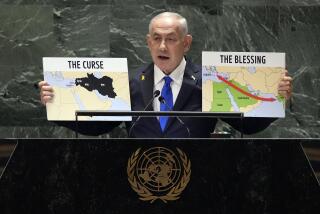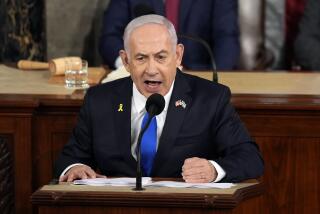Netanyahu Faces Likud to Defend Meeting With Arafat
- Share via
TEL AVIV — Prime Minister Benjamin Netanyahu on Thursday night went before the bitterly divided rank and file of his Likud Party to defend his brief handshake with Palestinian leader Yasser Arafat, and warned that dissenters have no place in his conservative government.
Hundreds of Likud faithful rose to their feet and cheered as Netanyahu arrived at a party central committee meeting a day after reluctantly accepting Arafat as a partner in peacemaking. The other half booed, claimed betrayal and stayed angrily seated in front of their party chief and prime minister.
One woman remained standing, but with an open umbrella--a protest meant to recall British Prime Minister Neville Chamberlain’s fateful meeting with Adolf Hitler before World War II.
In speeches, Uzi Landau, a Likud member of the parliament, or Knesset, accused Netanyahu of buckling under international pressure. Science and Technology Minister Binyamin Begin called the Arafat meeting “a severe defeat.” Infrastructure Minister Ariel Sharon warned Netanyahu that governments can be replaced but not Jewish holy sites in the West Bank and Jerusalem.
Netanyahu lashed back.
“The meeting yesterday was not easy, but leaders are elected for tough hours,” Netanyahu told the Likud crowd. “We said that we would implement the existing [peace] agreements on the condition that the other side does. We said we would talk to the other side without conditions. Those who argue with this now shouldn’t have joined the coalition or the government.”
Earlier, on television, the prime minister had threatened to fire government ministers who opposed his policies. In the meeting, he indirectly reminded them that he is the first Israeli prime minister elected by a direct vote of the people, rather than by the Knesset--and thus the most independent so far of his party.
“There is only one prime minister, not 10, and I intend to go ahead,” Netanyahu said.
A few in the audience shouted Sharon’s name in response, confirming the predictions of political commentators that Netanyahu’s meeting with Arafat--a watershed event in the history of Israeli-Palestinian peacemaking--appeared likely to permanently divide the right-wing nationalist camp.
“The Likud central committee convention today may yet be remembered as the beginning of the campaign that led to the breakup of the right,” wrote Hemi Shalev in the newspaper Maariv on Thursday.
Shalev sees Netanyahu, a sudden pragmatist, at the head of a moderate right wing willing to bend ideology “to suit reality,” while the “extreme right” falls into line behind Landau, Begin and Sharon.
That seemed to be the case in the hallways, where Likudniks for and against the Arafat meeting nearly came to blows.
Many members said they felt Netanyahu had taken a necessary step in meeting with Arafat. They had voted for Netanyahu in May to continue peace negotiations slowly and with toughness, not to kill the peace process.
Others felt Netanyahu had no choice but to meet Arafat because Netanyahu had inherited a bad agreement from the former Labor government and was obligated to honor it. But, mirroring criticisms lobbed at Arafat by the Palestinians, they said Netanyahu had received Arafat too soon, without securing any favorable conditions or commitments from the president of the Palestinian Authority.
Still others felt betrayed by Netanyahu, who they said had vowed never to meet Arafat or accept agreements signed with Arafat’s Palestine Liberation Organization. They said they feared that it was only a matter of time before Netanyahu made further concessions on issues such as redeploying Israeli troops from Hebron, withdrawing from West Bank settlements or granting the Palestinians statehood.
Outside the hall, the Council of Jewish Communities of Judea, Samaria and Gaza issued a statement on the Netanyahu government’s first “one hundred days of disappointment,” because the government had failed to free up empty houses for sale and expand construction in the settlements in the West Bank during its first 2 1/2 months in office.
Inside, doubters combed Netanyahu’s speech for clues to his intentions.
To wild cheers from half the crowd, Netanyahu declared: “There will be no Palestinian state.”
“I don’t believe him,” one man muttered.
“The West Bank and Gaza settlements will thrive,” Netanyahu said.
“Did you hear?” one member of the audience said to another. “He didn’t say they will grow.”
More to Read
Sign up for Essential California
The most important California stories and recommendations in your inbox every morning.
You may occasionally receive promotional content from the Los Angeles Times.










